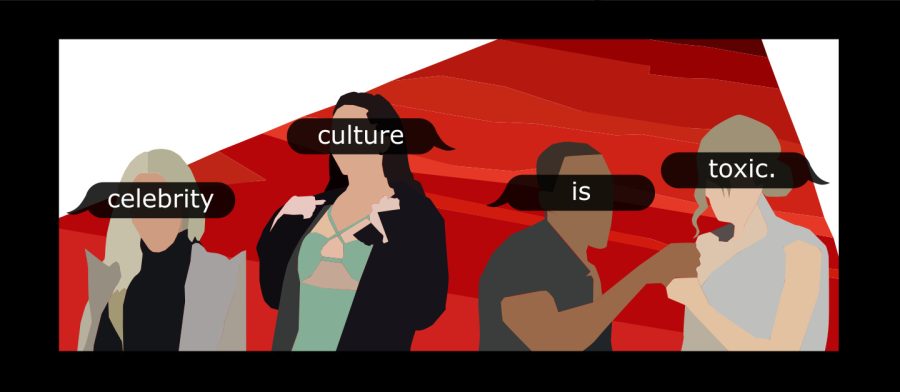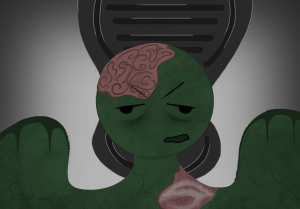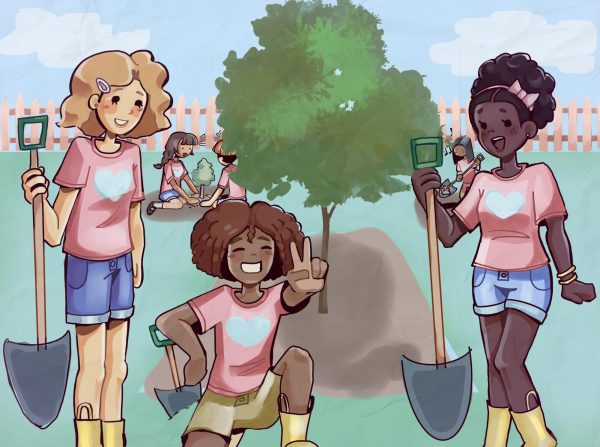Celebrity culture is toxic, here’s why
Celebrity culture has evolved from flashy magazines and physical tabloids— with social media, fans have even more power to influence celebrity careers.
March 1, 2022
Picture Hollywood’s stars in luxurious suits and gowns, smiling brightly for red carpet photographers. Now picture those same faces plastered all over social media, captioned with shocking scandalous details. The heavenly highs and rock-bottom lows of celebrity culture are accompanied by toxic and dysfunctional dynamics that don’t just affect the beloved and hated stars, but also the ways in which fans and everyday people interact with them.
Cancel Culture presents fans with conflicting caveats— what’s right and what’s wrong?
As Hollywood’s newest weapon hanging ominously over celebrity careers, cancel culture combines mob mentality with social media’s supersonic speed to jeopardize a celebrity’s reputation. When an account posts harmful alleged information, newfound or resurfaced, it’s only a matter of moments before the news spreads like wildfire across social media and a response is anticipated from the celebrity under fire. It can be approached in two different ways: remaining indifferent to the scandal at hand and continuing to appreciate the art of the criticized celebrity, or responding to the scandal as an act of social responsibility and calling for accountability.
Neither are foolproof approaches to a potentially ruinous celebrity scandal—although one can be apathetic to the disasters their favorites end up in, supporting their art fuels their career with financial success, and contributing to cancel culture as a means of social responsibility is highly prone to inaccurate information and misplacing blame on certain individuals.
According to Americans and ‘Cancel Culture’ by Pew Research, “Overall, 58% of U.S. adults say in general, calling out others on social media is more likely to hold people accountable, while 38% say it is more likely to punish people who don’t deserve it.”
Additionally, two of the top reasons those arguing for accountability chose were 1) the experience serves as a learning moment, and 2) it prompts further consideration of the consequences of people’s words and actions online, which stands in contrast to the top reason of those arguing for punishment: people need to consider the context of the criticized statement.
Idealizing celebrity lifestyles: all that glitters isn’t gold, or maybe it isn’t gold at all.
Social media platforms like Instagram and TikTok are based upon user-generated content, meaning that anyone can pick, choose and fine-tune what their followers see and perceive about them. Thus, celebrities post their picture-perfect memories and lifestyles, allowing followers to live their idyllic lives vicariously through their screens.
At a glance, TikTok’s user interface has all content sized to take up the entire screen, with functionality icons placed discreetly at the margins to not detract from the subjects of each short video, making the app an easy time trap where users become unaware of the time they spend scrolling through content. This, in combination with the easy ability to crop out unwanted details, is anathema to self-control and critical thinking.
As a result, fans crave lifestyles that aren’t as beautiful as they seem, idealizing the lives of strangers online without considering the realities of their lives. Columbia Business School professor Sandra Matz says it best via ‘Be Yourself’, a study by Columbia Business School: “Social media allows users a vast amount of control in deciding the persona they wish to show the world. With that control comes the temptation to create our ‘best self.’”
How do we deal?
As social media and celebrity culture continues to evolve, not only is it important to discern fact from fiction, but to consider priority as well. As down-to-earth as celebrity life can be sometimes, one must recognize that a life outside their own is automatically out of their control. Perhaps then, the tugs of celebrity gossip on one’s sense of morality, good judgment and healthy habits won’t be so tormenting after all.















